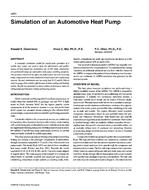Lebanon is a country that has a heavy dependence on energy imports in order to meet its domestic demand. Although it is a relatively small country, it rivals countries like Mexico and Brazil in electric power consumption per capita at 3,102 kWh/person. The Lebanese economy has a very high energy cost to GDP ratio, which translates to more money being spent on energy. Prior to 1975, more than 40 percent of Lebanon’s produced power was hydroelectric; however, due civil war, the majority of this infrastructure was damaged. Today, Lebanon depends on rehabilitated Heavy Fuel Oil (HFO) and Light Fuel Pol (LFO) power plants to satisfy its demand; a strategy that has, thus far, proved insufficient in satisfying the country’s energy demand. A large portion of this demand comes from existing commercial and residential buildings and developments. This accounts for upwards of 60 percent of the electricity consumption in the country. Building owners and businesses throughout the region, and the world, are starting to realize that energy consumption needs to be reduced before tackling supply side problems. The concept of Energy Performance Contracting (EPC) is one of the most effective mechanisms that can be used to tackle this problem. An EPC is an innovative solution that enables the reduction of energy consumption and demand using paid-from-savings, performance based mechanisms. The owner of a building does not pay upfront costs, and only pays a portion of the savings once it is generated. Deployed on a country-wide scale, this model can significantly aid deficient capacity by dealing with demand side consumption. In most cases, an EPC lays the groundwork for making energy efficiency upgrades to buildings and assets at no cost to the owner. The capital expenditure required to implement these upgrades are paid for throughout the life of the contract by the savings generated; a structure that ensures payment that is based solely on performance. A strong working mechanism between Lebanese government bodies, building owners, energy services companies and finance providers can help reduce the impact of buildings on the environment, while reducing energy demand and increasing asset profitability and value.
Citation: 2nd Intl Conf: Efficient Bldg Design
Product Details
- Published:
- 2016
- Number of Pages:
- 8
- Units of Measure:
- Dual
- File Size:
- 1 file , 1.1 MB
- Product Code(s):
- D-ICEB16-03


